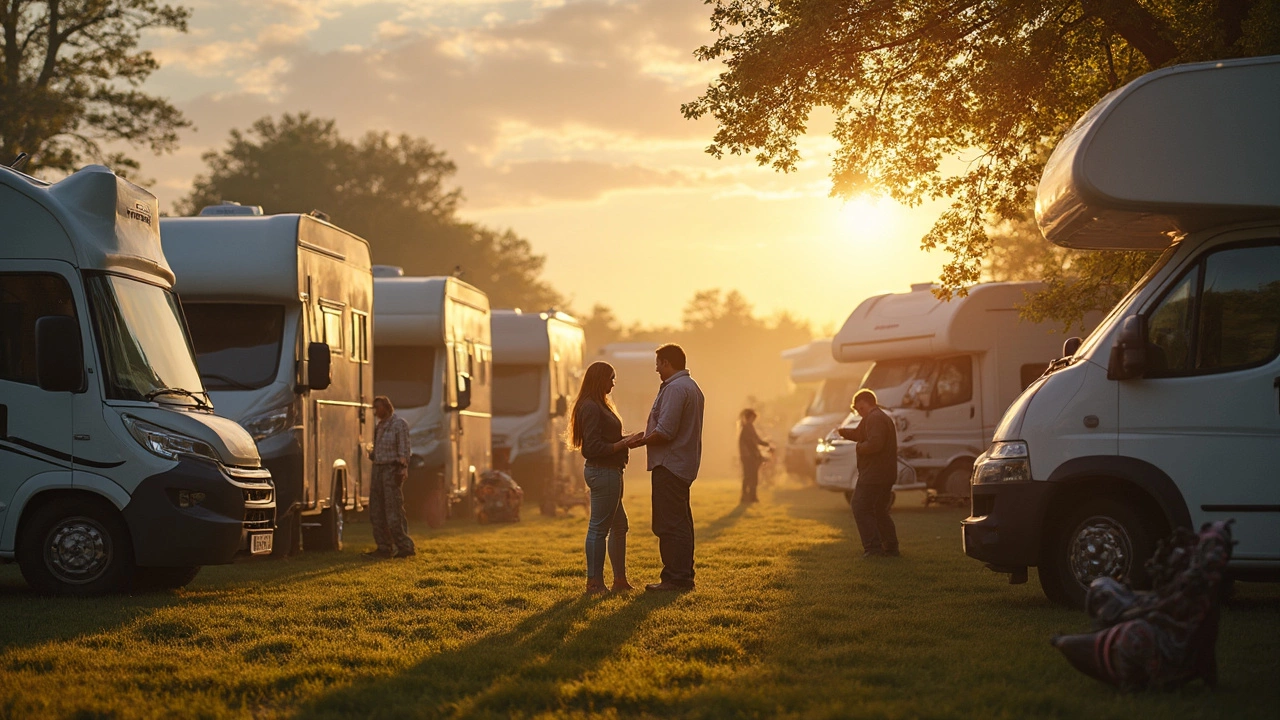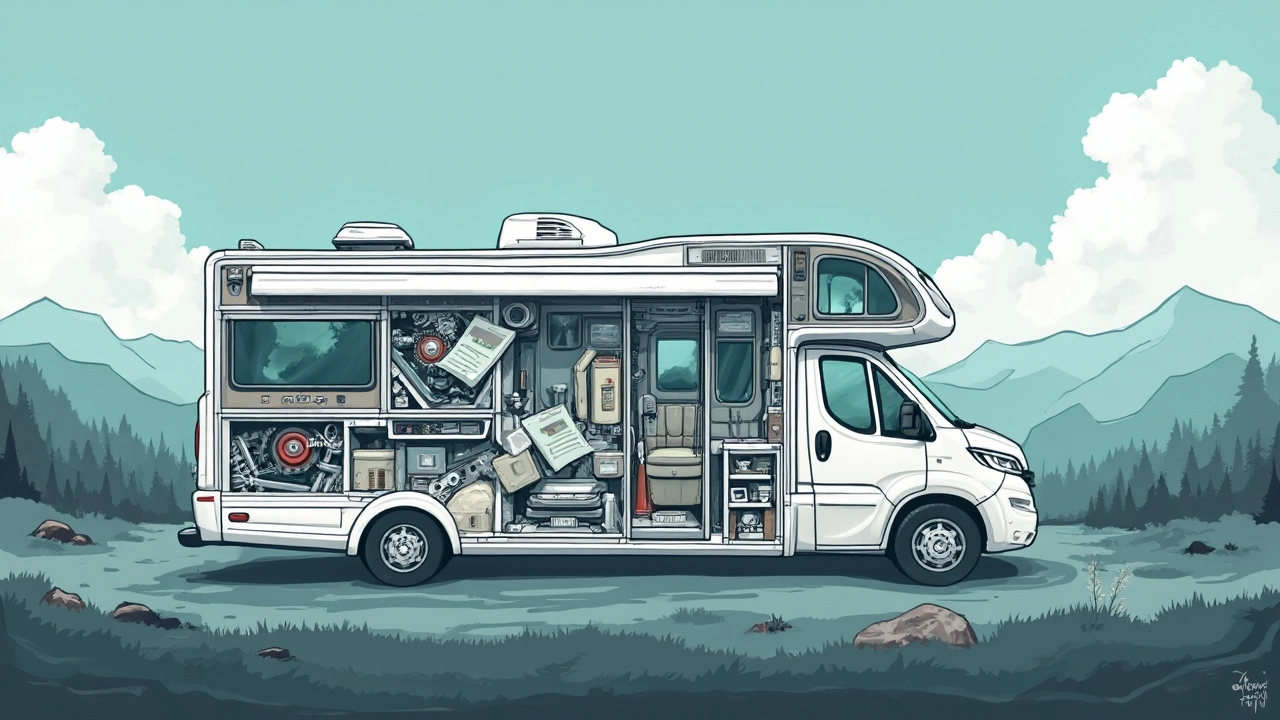Hidden Costs of Owning an RV: What You Need to Know
 Mar, 16 2025
Mar, 16 2025
So you're excited about the idea of owning an RV, cruising down the highway with the great outdoors at your fingertips. Who wouldn't be? But before you dive headfirst into the world of RV ownership, beware of the hidden costs that often come with the dream.
First off, let's talk maintenance. Just like with cars, RVs need regular upkeep. But given their size and complexity, maintenance can be pricier. Think oil changes, brake checks, and the occasional roof sealant treatment to keep leaks at bay. And don't forget the special tires – those aren't cheap either.
Then there's insurance. You might have budgeted for monthly premiums, but factoring in coverage for potential road mishaps or weather damage can push costs higher than expected. It's essential to shop around and find an insurer that gets RV life and offers competitive rates.
Maintenance and Repairs
When it comes to owning an RV, regular maintenance and repairs are inevitable. These rolling homes require a whole lot more attention than your average car. A typical oil change might run you about $100, but for an RV, you're looking at closer to $200. And that’s just a routine task!
Regular Upkeep
One of the biggies is keeping an eye on the roof. RV roofs are notorious for leaks, so you’ll want to do a thorough check and reseal it every couple of years. This could cost anywhere from $100 to $500, depending on how much work needs to be done. Also, let's not forget about brakes and tires—they're not just car parts scaled up. Those specialized tires start at about $300 each, and you’ve got to replace them every five years at most, even sooner if you’re doing a lot of miles.
Unexpected Repairs
Don't overlook those unexpected repairs. Whether it’s the air conditioning going out in the middle of a summer trip or a water heater leak, having an emergency fund specifically for RV fixes is a smart move. Repairing or replacing an RV water heater, for example, can hit you with a bill of $800 or more.
Plan for Parts and Labor
It's also worth noting that labor on these beasts can run around $100 per hour. Simple fixes like adjusting slide-outs or replacing windows can escalate into considerable costs given the hourly rates. Always get several quotes before agreeing to any major repairs.
| Service | Estimated Cost |
|---|---|
| Oil Change | $200+ |
| Roof Resealing | $100 - $500 |
| New Tires | $300 each |
Keeping on top of maintenance and repairs ensures your RV stays in peak condition and ready for those epic road trips. Skimping on maintenance can lead to bigger expenses down the road, so stay proactive!
Insurance Expenses
Ah, the world of RV ownership costs—if only it stopped at the sticker price. Insurance is one of the hidden factors that can significantly add up. The thing is, an RV can't just scoot by with typical auto insurance. Let's break down why.
Understanding RV Insurance
Since an RV is roaming abode, you require distinct coverage. Comprehensive policies cover situations beyond standard car mishaps—think hail damage while parked or theft while off hiking. It's worth noting that insurance expenses for an RV can be surprisingly higher than those for a regular vehicle. That's because they cover both vehicle and home-like features.
Monthly premiums? They vary big time depending on the size, type, and usage of your RV. A high-end Class A motorhome will likely see you paying more than if you had a smaller travel trailer. On top of that, if you're using your RV full-time, premiums increase. Why? Simply because more time on the road ups the chances of needing to make a claim.
Factors Affecting Your Rate
- Usage: Is it a weekend warrior or a full-timer? Frequency on the road matters.
- RV Type: Class A, B, C, trailer—each has different risk perceptions.
- Driving Record: A clean record trims costs just like with regular car insurance.
- Location: Higher crime rates in parking spots or areas with lousy weather could spike rates.
Consider bundling with home or auto insurance if you can. It might save you some pennies. Be sure to check for all eligible discounts—membership in RV clubs sometimes nets savings. If you're not picky, increasing your deductible decreases your premium; just be sure you can cover it when needed.
Cost Snapshot
To give you clearer details, here's an estimated cost range for annual insurance:
| Type of RV | Estimated Annual Premium |
|---|---|
| Class A Motorhome | $1,000 - $4,000 |
| Class C Motorhome | $800 - $3,000 |
| 5th Wheel Trailer | $300 - $1,000 |
Remember, these are just ballpark figures. Talk to a few insurers to tailor coverage that perfectly fits your RV lifestyle. You don't want to be caught off guard, especially when it's something as critical as insurance.

Fuel and Mileage Costs
Owning an RV sounds like a ticket to endless road trips, but let's talk about what fuels that adventure: fuel itself! RVs aren't exactly known for great fuel efficiency. In fact, most larger models average somewhere between 8 to 12 miles per gallon. So imagine the price of gas during those long cross-country trips. It's a cost you definitely want to factor in.
Fuel costs really depend on how often you use your RV and how far you travel. For example, a summer trip from New York to Florida and back could set you back several hundred dollars in fuel alone. If you're planning on regular adventures, those expenses can pile up quickly.
Tips to Save on Fuel
There are a few tricks to keep those fuel expenses in check. First, drive at a steady pace—sudden acceleration and braking can burn more fuel. Consider planning your routes to avoid traffic jams and steep hills, where fuel consumption spikes.
- Stick to highways when possible; they usually allow for more consistent speeds.
- Keep your RV's weight down by packing light—less weight equals better mileage.
- Regularly check tire pressure as under-inflated tires can reduce fuel efficiency.
Plan Your Mileage
Besides fuel, mileage is another factor that can hit your wallet. Some RV insurers set premiums based on miles driven annually. And if you're renting out your RV when you're not using it, renters might also be charged by the mile. Keeping track of these numbers can help you budget better for these hidden RV ownership costs.
Storage Fees
Once the open road trip is over and reality kicks back in, the big question is: where do you park this beast? RV storage fees can sneak up on you, especially if your driveway isn't RV-friendly or local regulations frown upon roadside parking.
Many new RV owners find themselves paying for storage because neighborhood associations don't allow these homes-on-wheels to stay parked in driveways for long. Storage costs can vary a lot, depending on location and amenities. A simple outdoor fenced lot might charge around $30-$60 a month, which seems manageable. But if you want your RV to stay in tip-top condition, indoor or covered storage—which can go up to $150 or even $300 a month—might be needed.
Types of RV Storage
- Outdoor Storage: Cheapest option, but exposes your RV to the elements.
- Covered Storage: Middle-ground option providing shelter from weather but still prone to temperature swings.
- Indoor Storage: Best protection, usually climate-controlled, but definitely comes with a higher price tag.
For those serious about protecting their investment, indoor and climate-controlled options shield against harsh weather and pests, potentially saving repair costs in the long run.
Motorhome costs like these might seem like just a parking spot fee, but over a year, they add up. Considering potential damages saved, investing more into proper storage often pays off. Many facilities also throw in sweeteners like 24/7 security, camera surveillance, and even dump station access, making them worth the buck.

Unexpected Expenses
Owning an RV can be a rollercoaster of costs, and the surprises aren’t always pleasant. Let's talk about some curveballs you might not see coming.
Repairs can hit when you least expect them. Even if you're great at regular maintenance, things can still go wrong. Imagine cruising through a remote area, and suddenly, a key component like the AC unit goes kaput. Repair shops might be miles away, and costs tend to creep up quickly, especially if you're in a pinch and need parts in a hurry.
RV ownership isn't just about memorable road trips; it's about the upkeep and potential mishaps. Mother Nature can throw a wrench, quite literally, into your plans. Consider facing weather-related damages like hail dents or wind-shattered awnings. You may not think about it when planning your route, but it's worth thinking about. Some folks even suggest investing in a portable weather radio to keep an ear on potential storms.
Miscellaneous Costs
Beyond the mechanical hiccups, there are sneaky little costs you'd never expect. Fees for dumping waste at certain sites can feel like they're nickel-and-diming you when in less-developed areas. Plus, if you love your creature comforts, RV park amenities like Wi-Fi often come with additional charges. Sure, data plans might cushion the blow, but streaming Netflix on the road isn't always 100% seamless.
Now, think about some rare scenarios, like critters finding their way inside your home on wheels. Pest control isn't typically on the RV owner's radar, but it becomes a priority when you've got ants invading your food supply or worse, damage-causing rodents.